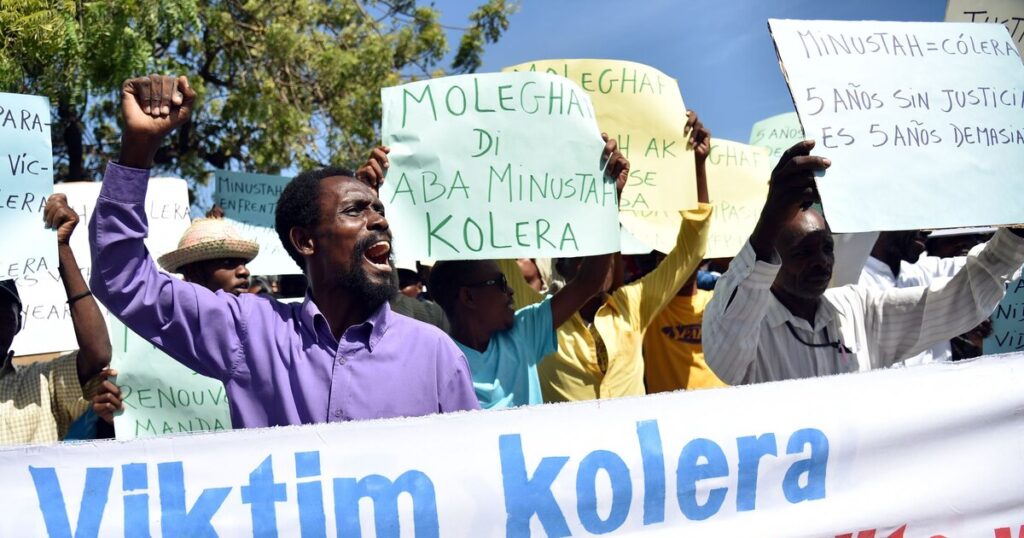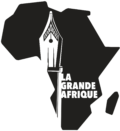
Demonstration by human rights defenders and victims of the cholera epidemic, October 15, 2015 in Port-au-Prince © AFP/HECTOR RETAMAL
It’s all too common to hear dismissive comments about Haiti’s current situation, hasty judgments that portray its inhabitants as solely responsible for their difficulties, or as “idiots”. Such rhetoric often fails to recognize the impact of external actions on the country’s history and present. Today, let’s focus on an episode that shook Haiti to its core: the introduction of cholera by a UN mission in 2010, a tragic event for which reparations are still pending.
BIASED RESEARcH IN THE SERVICE OF DENIAL
On January 12, 2010, Haiti was hit by a devastating earthquake that killed hundreds of thousands of people and left much of the country in ruins. As the international community mobilized to provide aid, UN peacekeeping troops from Nepal were deployed as part of the United Nations Stabilization Mission in Haiti (MINUSTAH).
The cholera epidemic in Haiti officially began in October 2010. The first cases appeared near the Artibonite River, quickly identified as the epicenter of contamination. Public suspicion soon turned to the Nepalese contingent of MINUSTAH, stationed not far from the river. Residents accused the peacekeepers of introducing the disease via wastewater discharges into the watercourses, but the UN denied all responsibility. In the international media, these accusations were often described as conspiracy theories with no scientific basis. Skeptics presented the allegations as attempts to scapegoat an unforeseen health crisis.
American researcher Rita Colwell, one of the central figures in the controversy over the origin of cholera in Haiti, had argued that the epidemic was not linked to UN forces. A pioneer in microbiology and an expert on cholera, she suggested that the epidemic had an environmental origin, due in particular to the proliferation of bacteria in stagnant water following the 2010 earthquake. However, her hypothesis was based on data that was subsequently called into question by other scientists. Genetic analyses carried out by independent teams, notably those led by Renaud Piarroux, invalidated these arguments. They showed that the cholera strain in Haiti was genetically identical to the one found in Nepal. This scientific evidence established a direct link between the introduction of the bacteria and the UN troops, refuting Colwell’s initial claims.
A DENIAL OF RESPONSIBILITY DESPITE THE DAMNING HUMAN AND SOCIAL TOLL
In just a few months, cholera spread like wildfire in a country already weakened by natural disaster. The epidemic infected over 820,000 people and caused the death of more than 10,000 Haitians. It plunged thousands of families into a nightmare, further exacerbating the humanitarian crisis.
Failing health infrastructures, shortages of drinking water and the absence of effective waste management amplified the catastrophe. Yet the international authorities, aware of the origin of the epidemic, had been slow to acknowledge their responsibility. For years, the UN refused to admit its role in the tragedy, despite overwhelming scientific evidence. It was only in 2016 that Ban Ki-moon, then UN Secretary-General, expressed regret. The organization proposed an action plan to eradicate the disease and improve sanitation infrastructures, but the promised funds – $400 million – were only marginally raised, and no direct compensation was granted to victims or their families.
The cholera epidemic in Haiti is not just about numbers. It symbolizes the contempt shown by outside powers for Haitian lives, and the absence of justice for a people overwhelmed by crises of their own making. Even today, this tragedy is a stark reminder that the actions of outside powers, whether military, economic or health-related, can have devastating long-term consequences. Recognizing these impacts is an essential condition for building a fairer future for Haiti and its people.
We shall not forget.
